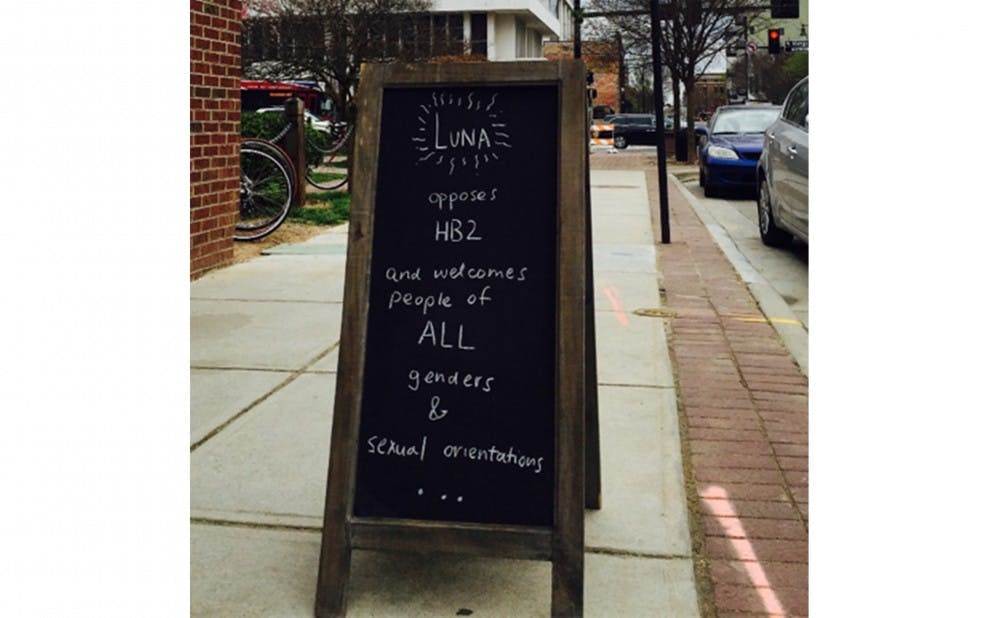North Carolina’s controversial House Bill 2 has Durham County's business scene concerned for the future.
The act has had consequences for Duke. In July, the field hockey and men's basketball programs faced schedule changes after Albany refused to play the teams because of an executive order by New York Gov. Andrew Cuomo banning non-essential travel to North Carolina. HB2 has also led performers such as Maroon 5 to cancel their events and in general has led to businesses leaving the state.
Looking at Durham specifically, the financial impact of HB2 has remained hard to quantify. There is limited data from which to draw direct correlations between the legislation and patronage of local businesses, said John White, vice president of public policy at the Greater Durham Chamber of Commerce.
Restauranteurs and local hoteliers, however, have begun to express their frustration with the bill.
Shawn Stokes MIDP ‘11, chef and owner of Luna Rotisserie and Empanadas on Main Street, publicly denounced the act on a sign outside the restaurant.
“We’ve only heard responses to the message we posted on social media and our sandwich board, during the weeks immediately after the law was passed,” Stokes wrote in an email. “99 percent of feedback was supportive, including face to face expressions of gratitude for speaking out against the law, as well as several tweets and Facebook posts on the topic.”
Some of Durham’s liberal tendencies can be attributed to Duke but also to rapidly growing industries including technology, international development and biological engineering, Stokes wrote. In 2012, 75 percent of the Durham County vote went to President Barack Obama.
Vaguely Reminiscent, a boutique located on Ninth Street near East Campus, similarly chose to put a sign outside its business in protest of the legislation.
“Everyone here feels pretty strongly about it,” said Karen Merowcheck, a store employee, in a prior Chronicle article. “It wasn’t like an official movement. I think people are taking it upon themselves to print and hang their own signs.”
Stokes added that it is important for people to remember HB2 is a civil rights issue and not necessarily an economic one. "Voting with their dollars" is only effective if it leads to a repeal of the law, he argued.
“The effects on HB2 on businesses have already been demonstrated," Stokes wrote. “Every future concert, convention, game that chooses to boycott North Carolina, just adds to the already hundreds of thousands of visitors who have already gone to other states.”
However, Charles Becker—a research professor of economics—wrote in an email that the financial impact to date in Durham has been minimal. Some investments have been deterred, but the impact will not be felt immediately, he explained.
The Greater Durham Chamber of Commerce has publicly denounced the act and is already taking steps to help minimize the financial impact of HB2, White said. While data on the impact on Durham is not available, White said businesses have expressed concerns about lost customers.
"We have heard from a number of businesses," he said. "We have heard from hoteliers who have specifically said that they have had conferences that were lined up to come to Durham that have decided to take their business elsewhere. We have directly been involved with trying to recruit companies that said they are no longer coming.”
White noted that prior to the Greater Durham Chamber of Commerce taking a position, members were polled and feedback was analyzed. Some members supported the legislation but an overwhelming majority voiced dissent, he explained.
Even seemingly disparate economic actions have major consequences as part of a “domino effect” that has been created by the law, he said.
In Durham County, visitors staying in hotel rooms must pay a bed tax. With some people being discouraged to visit Durham, fewer rooms are in use and therefore less taxes are paid to the count. This reduces the potential for economic development, White explained.
A local hotel—21c Museum Hotel—has also taken a public stance against HB2, an action the hotel said has actually helped business.
His hotel recently installed new restroom signs with works of art numbered and signed by local artist Peregrine Honig. The sign features a split figure half a woman in a dress and half a man, with the caption "we don't care" underneath.
"Actually, we have guests staying with us because of our position on HB2," said Scott Griffith, the hotel's general manager.
Get The Chronicle straight to your inbox
Signup for our weekly newsletter. Cancel at any time.

